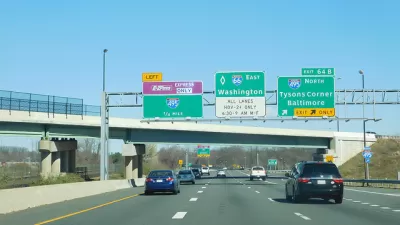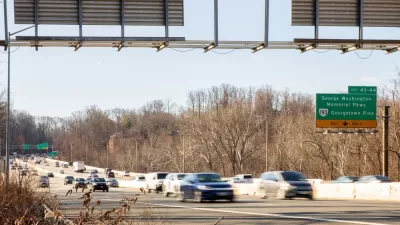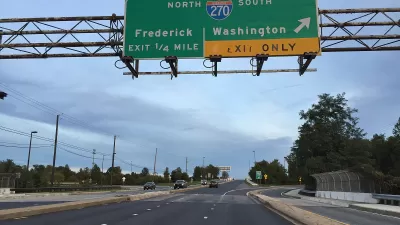Maryland Governor Larry Hogan says the state was “blindsided” by the decision, which further delays the $7.6 billion plan.

A plan to build four toll lanes on Maryland’s Capital Beltway and Interstate 270 was blocked by the Federal Highway Administration (FHA), potentially delaying the project beyond Governor Larry Hogan (R)’s term, which ends in January. According to an article by Bruce DePuyt in Maryland Matters, “Hogan said Maryland was ‘completely blindsided’ by the move and he accused acting Federal Highway Administrator Stephanie Pollack of issuing a ‘rogue’ decision against the recommendations of agency staff.”
Some backstory: “In June, Montgomery County Executive Marc Elrich (D), urged that a final decision on the project be delayed to give people more time to read the report. Shortly thereafter, transit advocate Ben Ross pressed the U.S. Department of Transportation to look into ‘possible scientific fraud,’ after he said he found unexplained changes in the traffic models the state used to determine how much time motorists would save by using toll lanes.”
Some residents opposed Hogan’s plan for the ‘express lanes’ from the beginning. “It also drew condemnation from environmentalists, transit advocates and local leaders. Pointing to the sometimes eye-popping tolls that Virginia motorists pay, some critics maintained that only upper-income people would derive benefit from the new lanes.”
Hogan insists he has scaled down the plan and agreed to requests from local leaders such as letting transit vehicles pass for free and adding a bike and pedestrian pathway. Noting that the delays have added 20 percent to the total cost of the project, Hogan “pledged to continue his pressure campaign on the Biden administration and federal transportation officials to ‘immediately’ rescind their delay.”
FULL STORY: Federal agency delays Md. toll lanes plan; Hogan urges Biden to reverse “outrageous” action

Planetizen Federal Action Tracker
A weekly monitor of how Trump’s orders and actions are impacting planners and planning in America.

Restaurant Patios Were a Pandemic Win — Why Were They so Hard to Keep?
Social distancing requirements and changes in travel patterns prompted cities to pilot new uses for street and sidewalk space. Then it got complicated.

Maui's Vacation Rental Debate Turns Ugly
Verbal attacks, misinformation campaigns and fistfights plague a high-stakes debate to convert thousands of vacation rentals into long-term housing.

In California Battle of Housing vs. Environment, Housing Just Won
A new state law significantly limits the power of CEQA, an environmental review law that served as a powerful tool for blocking new development.

Boulder Eliminates Parking Minimums Citywide
Officials estimate the cost of building a single underground parking space at up to $100,000.

Orange County, Florida Adopts Largest US “Sprawl Repair” Code
The ‘Orange Code’ seeks to rectify decades of sprawl-inducing, car-oriented development.
Urban Design for Planners 1: Software Tools
This six-course series explores essential urban design concepts using open source software and equips planners with the tools they need to participate fully in the urban design process.
Planning for Universal Design
Learn the tools for implementing Universal Design in planning regulations.
Heyer Gruel & Associates PA
JM Goldson LLC
Custer County Colorado
City of Camden Redevelopment Agency
City of Astoria
Transportation Research & Education Center (TREC) at Portland State University
Jefferson Parish Government
Camden Redevelopment Agency
City of Claremont





























